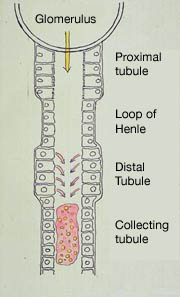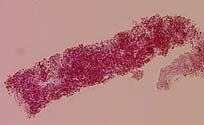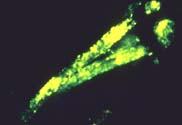Granular casts
Clinical relevance
Granular casts are made from plasma proteins. They are common in almost all forms of kidney disease. They are not specific to one type of pathology. They are observed in kidney diseases that can be ischemic, infectious, or toxic (aminoglycosides). Kidney dysfunction can also occur in healthy people as a result of intense physical effort.
Origin

Granular casts consist of a mucoprotein matrix with incorporated plasma protein granules. The origin of these granular casts is unknown. They do not originate from the destruction of existing cellular casts. Granular casts are relatively frequent.
Identification
Granular casts are morphologically very similar to hyaline casts, but they have a higher refractive index because of their protein composition, which is often very thin and can completely fill the matrix. However, these granulations can be sometimes very large and are then usually accompanied by a proteinuria.


Granular cast: bright field microscope (left), fluoresecence microscope (right)